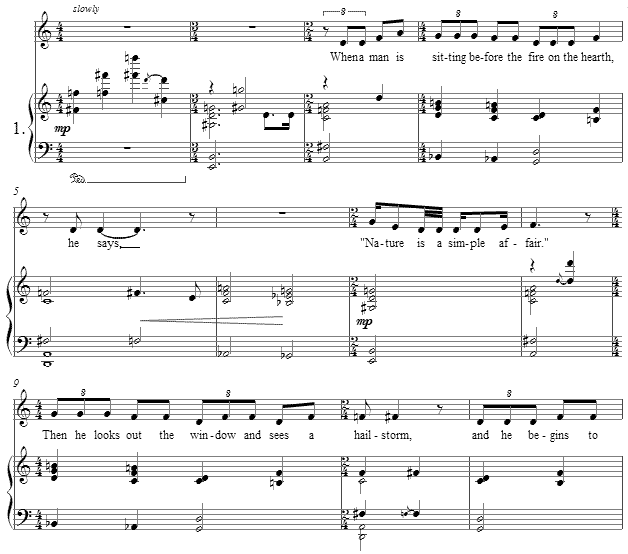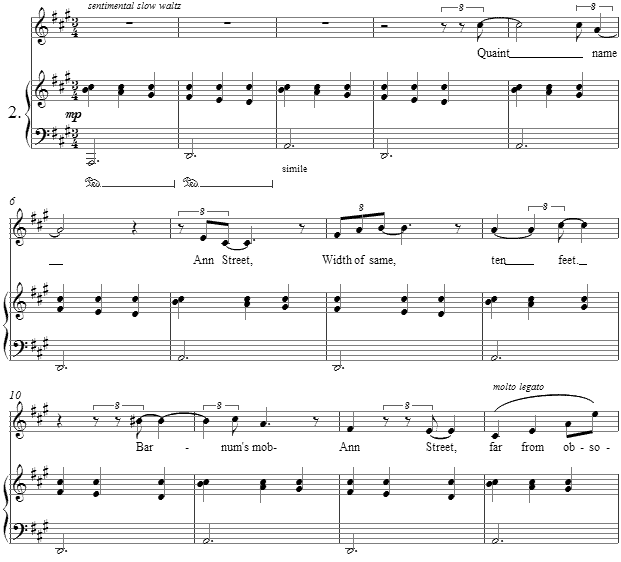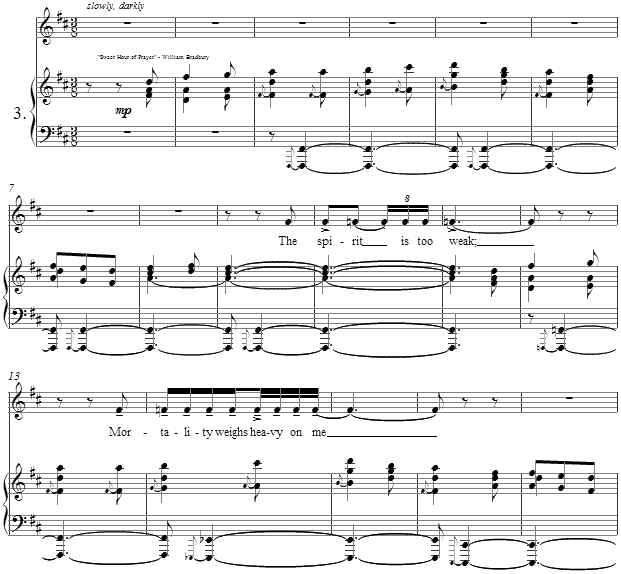Music and Texts of GARY BACHLUND Vocal Music | Piano | Organ | Chamber Music | Orchestral | Articles and Commentary | Poems and Stories | Miscellany | FAQs |
Three Little Americana Songs - (1985)
texts as set once by Charles Ives
Three songs for medium voice and piano
i. Nature - (no citation) [ 1 page, circa 50" ]
When a man is sitting before the fire on the hearth, he says,
"Nature is a simple affair."
Then he looks out the window and sees a hailstorm, and begins to think that
"Nature can't be so eas'ly disposed of."
ii. Ann Street - Maurice Morris by courtesy of "The New York Herald" (1921) [ 2 pages, circa 1' 45" ]
Quaint name, Ann Street.
Width of same, - ten feet
Barnum's mob - Ann Street,
far from obsolete.
Narrow, yes, Ann Street,
but business both feet
(Nassau crosses Ann Street)
Sun just hits Ann Street.
Then it quits - some greet!
Rather short, Ann Street!
iii. Like a Sick Eagle - attributed to Keats [ 2 pages, circa 1' 40" ]
The spirit is too weak;
mortality weighs heavy on me
like unwilling sleep,
and each imagined pinnacle and steep
of God-like hardship tells me I must die,
like a sick eagle looking toward the sky.
Total duration [ 5 pages, circa 4' 15" ]
Charles Ives
These three little settings take texts which have also been set by that unique American "oner," Charles Ives, and see the same words and surrounding culture somewhat differently. An appreciation of Ives is intended, for I myself have sung his songs with great enjoyment. It is another way to think about his choice of texts and how to imagine them being alternatively set.
Charles Edward Ives (1874–1954) was successful in the insurance business, and his music was largely ignored during his life, many of his works going unperformed for years. In 1894, Ives attended Yale University, studying under composer and organist Horatio Parker. Here Ives composed in a choral style similar to his mentor, writing church music and even an 1896 campaign song for William McKinley. But not intending to make a career of music, Ives studied a broad array of subjects at Yale, including Greek, Latin, mathematics and literature. He was an accomplished pianist and organist, and was capable of improvising in a variety of styles. After working in several other firms, he and his friend Julian W. Myrick formed their own insurance agency Ives & Co., which later became Ives & Myrick, where he remained until Ives retired. Ives died in 1954 in New York City.
Ives was an enthusiastic songwriter, and his self-published song anthology contained 114 works (Redding, Connecticut 1922) remains a prize in my own library. These settings are a little respectful nod in the direction of Ives' singular art and craft. As an iconoclast, he had little respect for the "schools" which bind academic composers to a certain style and limit their craft. In that, Ives shares with may poets whose works I have chosen to set the sense that "style" and subject matter are a matter of individual choice and not the province of a parochial perspective such as one sees throughout academia in the twentieth century leading to the many artistic blind allies into which the orthodoxy of the avant-garde has so firmly stumbled.
Ives underscores the truth that "nature can't be so eas'ly disposed of." The modern enthusiasm for one of the many flavors of environmentalism is encouraged by the underlying assumption that nature is manageable, a strange orthodoxy which seems a direct descendant of the miracle workers of centuries ago, and even the "rain makers" of the American West. As with any orthodoxy, those who do not acknowledge the ascendant power of their myth are to be punished. In fact, it is often nature which has her way, irrespective of man and his ego.
The New York Herald was a large distribution newspaper based in New York City that existed between 1835 and 1924. The text, "Ann Street," possibly struck Ives as charming as he read his copy of that newspaper over breakfast. The simple accompaniment gesture from this song -- a sentimental slow waltz -- was reused in my setting of Whitman texts, An Echo from the Shore.
The last text is an excerpt from a longer poem, "On Seeing the Elgin Marbles" of John Keats. The entirety of the poem reads as follows:
My spirit is too weak — mortality
Weighs heavily on me like unwilling sleep,
And each imagined pinnacle and steep
Of godlike hardship tells me I must die
Like a sick eagle looking at the sky.
Yet 'tis a gentle luxury to weep
That I have not the cloudy winds to keep
Fresh for the opening of the morning's eye.
Such dim-conceived glories of the brain
Bring round the heart an undescribeable feud;
So do these wonders a most dizzy pain,
That mingles Grecian grandeur with the rude
Wasting of old time — with a billowy main —
A sun — a shadow of a magnitude.
The old hymn tune, "Sweet Hour of Prayer" by William Bradbury, moves across the accompaniment as the bass line descends with an opposing weight of "mortality," the dissonant counterpoint to hope.
Another short cycle of songs is based on poems authored by Charles Ives, titled The Circus Band and Other Delights.
The score for Three Little Americana Songs is available as a free PDF download, though any major commercial performance or recording of the work is prohibited without prior arrangement with the composer. Click on the graphic below for this piano-vocal score.



